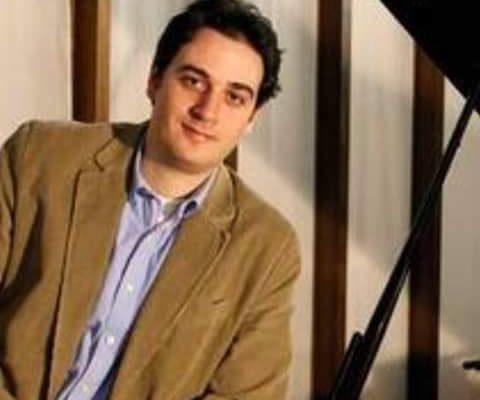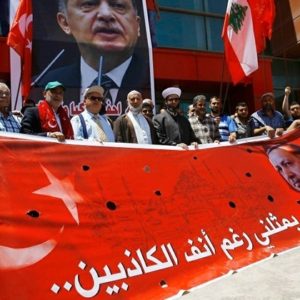The New Eastern politics Art and Culture Contributor, Christiane Waked spoke to Serge Helou, a brilliant Lebanese composer who lives in Pennsylvania and uses his music as a therapeutic tool to communicate with immigrants with post-traumatic stress disorder confirming what Friedrich Nietzsche said: ‘Without music, life would be a mistake.’
C.W: Serge you are a board certified music therapist trained in France, how are you applying your know-how in music to heal the post-traumatic stress disorder (PTSD) with immigrants that live in Pennsylvania, U.S. without reviving the past?
S.H: PTSD is an underlying problem that can live inside of us for months, even years without revealing itself. Although many types of therapies can be so effective in treating PTSD, I find that music can be a wonderful and gentle tool that can be used to work with people that had traumatic experiences. As Hans Andersen said, “where words fail, music speaks.” People with PTSD live in fear, depression, and isolation without being aware of what’s causing their problems. They might realize that certain events have drastically changed their lives but they don’t necessarily know how to verbally express themselves and to be able to understand their own feelings. However, those people might be able to express their emotions through music. For example, by playing the drum a certain way they can let their anger out; by exploring different instruments and different sounds, music will speak for them. I see music like a time machine. It can take you to your past or bring your past to the present. I usually encourage the second option, letting the patients explore their feelings while staying aware of their hear-and-now. Traveling back to their past- of course, figuratively speaking- is like asking the patient to be exposed again to what has caused their trauma, which, at least in my opinion, can be overwhelming and damaging to their mental health. Healing is a big word. I wish I could say I heal people with music. What makes us prosper in life is not forgetting our past but remembering every day that we got stronger by overcoming our biggest problems.
C.W: Do you sometimes identify yourself with the refugees since yourself have grown up in Beirut during war time?
S.H: I always identify myself with the immigrants that left their homeland seeking refuge and a better place to live. I was not diagnosed with PTSD but I can certainly disclose that certain music or certain sounds still remind me of the sound of bombs during war time. When composing music, I often feel the need to imitate those loud sounds, not sure if I’m expressing my feelings or I just want the listeners to understand what we have been through. But I thank God that I didn’t have a traumatic experience moving from Lebanon, although it was painful to leave all my loved ones behind. My heart is with all the millions of people that are forced to flee their countries not knowing where to go or whether they are going to survive.
C.W: You composed a “Lebanese Rhapsody” that was played by an orchestra, how difficult was it to arrange oriental music to be performed by an American ensemble?
S.H: Actually it was very easy for me to do the arrangement. The Lebanese Rhapsody tells a lot about my musical identity. I grew up listening to Arabic/oriental music but I was also influenced by Classical Western music. The difficulty was in performing the piece. Al-Bustan Takht Ensemble and The Prometheus Chamber Orchestra were the perfect match for my piece. The takht gave all the Arabic “spices” and rhythm my piece needed and the chamber orchestra provided the harmony and the western feeling.
C.W: I know that you started to play guitar since you were a kid, but today as a music composer what is your favorite musical instrument?
S.H: I play the guitar every day in my music therapy practice. It is my favorite instrument when it comes to spending some time alone, meditating, or praising. But I choose the piano though when I’m being more creative and working on my compositions.
C.W: With the technology these days, how easy or how hard it is to compose music these days?
S.H: Unfortunately it is so easy to produce music these days. A couple of years ago I was working on a documentary with a very well-known organization in the U.S. It was about a humanitarian project in Africa. I sent them my music but never heard back from them again. Later I learned that they had bought an electronic music from the internet for about $20. I saw the video on YouTube and, of course, the music they had picked sounded like millions of other cheap music.
I use technology only to replace real instruments by virtual instruments.
C.W: What kind of music, can I find on your playlist besides classical?
S.H: Some people say they can still hear my “signature” no matter what style I compose. But other than classical you would hear some Arabic style, rock style, children and spiritual songs.
C.W: Finally, I can reveal that you were my classmate and we took guitar classes together, what do you still remember from your early years in music? Are you still as passionate about it as before?
S.H: Great memories! I still remember those mornings where, on the day we had guitar classes, we would carry our instruments and everybody would look at us with wonder. We were the “cool musicians.” I miss those days with Pierre and Paul our teachers.
Christiane Waked is a former Press Attaché of the French Embassy to the UAE (2010-2015) also worked as linguist and analyst in the French Interior Ministry (2005-2008)







